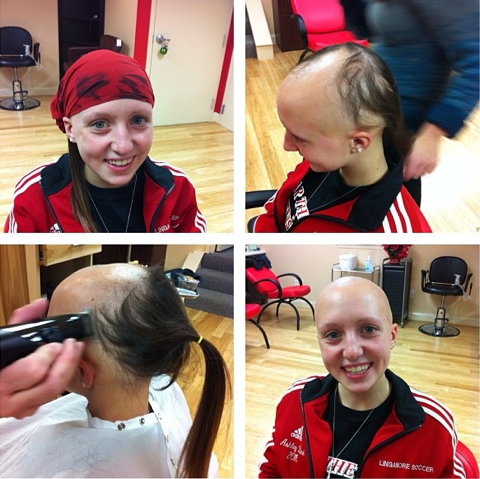No hair don’t care: Zink battles Alopecia

Ashley Zink: Before, during, and after shaving her head
October 2, 2013
Imagine waking up every morning, looking in the mirror, and seeing that you’re bald. This is something junior Ashley Zink goes through on a daily basis. She is going through what only 2% of the population is experiencing.
It’s not cancer: it’s Alopecia.
Alopecia is a condition that causes hair loss. There are three types: Areata, the most common, where the victim loses patches of hair on the head; Totalis, where the sufferer loses all of the hair on the head; Universalis, the most severe, causes the person to lose all hair on the body. This is the type Ashley has.
It all began in 2011, Ashley’s freshman year. “I was scared at first. The doctor told me I was losing all my hair and there was no treatment,” said Zink. “It’s especially harder because I’m in high school. People judge me so I got to see who my real friends were.”
“Starting in high school with no hair was hard. I felt left out. People were judging me, especially boys, but I had to deal with it. Teenagers can be harsh but, fortunately, I have people to get me through it,” Zink said.
One of these people is Ashley’s senior boyfriend, Shane Stickley, who’s been with her since her diagnosis. Ashley says he shaved his own head to support her, stood up for her countless times, supported her fundraisers, and has always been there for her.
“I don’t understand what people get out of making fun of her. No one made fun of her at first when she was insecure, but now that she is confident about it, people are being more and more mean,” Stickley said.
Ashley’s mom, Monica Zink, has been with Ashley through the struggles. “Ashley’s diagnosis caused some difficult times here at home. We tried to support Ashley and help her get through each day. We tried to be strong for her, but still felt helpless, as there was not much her Dad and I could do to “make it better”. We also had to deal with Ashley’s mood swings. She had some days that were good and some that were very difficult. Things have improved, as Ashley has really embraced her diagnosis and seems to be handling most things very well,” said Mrs. Zink.
Teenagers often struggle with self-image issues. Being a bald teenager makes this struggle harder. “I don’t like when she wears makeup and wigs because she is beautiful the way she is,” Stickley said.
Having self-image issues is less of a problem for science teacher Mark Sunkel, who is also a victim of Alopecia. He has the form Areata.
“There are a lot of worse illnesses. Losing your hair isn’t that big of a deal to me,” said Sunkel. “You just have to learn to adapt to it. Being older with Alopecia is not as serious to me. Being in high school would be much harder.”
There is no known cure for Alopecia because no one knows what causes it. “Your auto immune system attacks hair follicles and stops them from growing, but they haven’t figured out why,” Sunkel said.
To help Ashley cope with her condition, she belongs to the National Alopecia Areata Foundation (NAAF). NAAF supports research to find a cure or acceptable treatment for Alopecia Areata, supports those with the disease, and educates the public about Alopecia Areata. “The director of NAAF, Gary Sherwood, put me on the cover of the NAAF magazine. If there were any newly diagnosed members in Maryland, Gary would send them to me and I would help them be able to deal with it,” said Zink.
“As you know, being a teen can be stressful. You’re growing up, your body is going through changes, you’re maybe dating and going through your first relationship issues, you maybe have to prepare for college and what you want to do with your life. Now throw in hair loss on top of all that! That’s what everyone should remember is that young people with Alopecia Areata are just your normal teens. They wear the same clothes as other teens, listen to the same music, do just as well in school, and get in the same trouble. The only difference is they have no hair, but there’s nothing wrong with them otherwise,” said Sherwood.
Last year NAAF met in DC and Ashley was actively involved.
“Ashley performed a variety of service activities for NAAF and the cause of Alopecia Areata awareness. For two consecutive years (2012-2013), she was recognized as a Top 10 Fundraiser for NAAF’s Annual Tortoise & Hair™ walkathon held at the Conferences. At our 2012 Team Up event with the Baltimore Orioles, Ashley manned the information booth and shared her story. During Alopecia Areata Awareness Month of September 2012, she sold support bracelets at her high school. And just this past June, she participated in fundraising and promoting Alopecia Areata at another event with the Orioles,” said Sherwood.
“It’s hard to know I will never have a full head of hair again, but I like being bald and I am confident,” said Zink.
Even with those who are mean, there are people who have been and will remain by Ashley’s side.
“I didn’t take much mind to it when I found out she was diagnosed. I still liked her. A bald girl is still a girl,” said Stickley.


